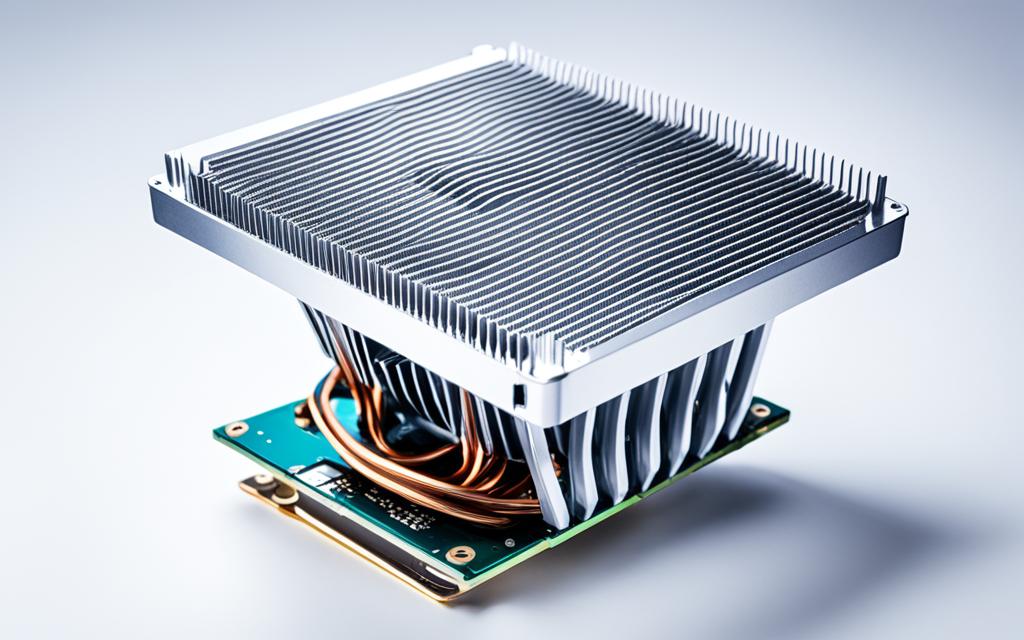Table of Contents
Many wonder if CPUs come with coolers already installed. This is important for regular users and tech fans alike. Not every processor comes with a cooling system in the box. Bundled CPU coolers are common with less powerful CPUs. They help manage heat sufficiently without extra purchases. Yet, more advanced chips might need you to find additional cooling options for the best performance. We’ll explore how vital effective cooling is, different cooler types, and which CPUs come with them. For more on building a computer, check out this link1.
Key Takeaways
- Not all CPUs include bundled coolers; performance considerations play a role.
- Less powerful CPUs tend to come with adequate cooling solutions included.
- Understanding your cooling needs is essential for optimal performance.
- High-performance processors often require aftermarket cooling solutions.
- Specific models from both AMD and Intel may include pre-installed coolers.
Understanding CPU Cooling Solutions
CPU cooling is super vital for keeping your computer running well and lasting long. When a CPU works hard, it gets really hot. So, it needs good cooling to keep from slowing down. This helps your computer perform better.
Importance of Cooling in Computer Performance
Cooling your CPU right means your system can run at full speed without overheating. If it gets too hot, it’ll slow down, which nobody wants. Coolers help keep your CPU healthy, making your computer stable when you push it hard.
Types of CPU Coolers
Different CPU coolers meet different needs. Air coolers are simple and dependable because they have no moving parts. They cool the CPU by blowing air over a metal block. Liquid coolers, or AIO systems, use a fluid to take the heat away to a radiator. This can cool the CPU better than air can. AIO coolers have been popular since the mid-2000s. They come in various sizes to fit many computer cases2. They’re usually 30mm to 40mm thick. Most computer cases can fit a radiator and fan setup that’s about 55-60mm thick2.
| Type of Cooler | Cooling Method | Typical Price Range | Advantages | Disadvantages |
|---|---|---|---|---|
| Air Cooler | Air over heatsink | £19 to £78 | Reliable, lower maintenance | Less cooling performance in high-demand scenarios |
| AIO Liquid Cooler | Liquid transfer to radiator | £45 to £200 | Higher cooling efficiency, quieter operation | Requires larger cases, potential noise from pump |
| Custom Liquid Cooling Loop | Liquid through various components | £100 and above | Best performance, highly customizable | Complexity, higher risk of leaks, maintenance needed |
Choosing the best cooler depends on the CPU’s Thermal Design Power (TDP). This tells you how much heat it can handle. Air coolers focus on moving lots of air. Liquid coolers are all about moving heat away efficiently. For those who love to push their PCs to the limit, custom cooling loops are perfect. They’re pricey but great for overclocking3 and4.
Which CPUs Come Bundled with Coolers?
When shopping for CPUs, it helps to know if they come with coolers. AMD and Intel include coolers with many CPUs, mainly for everyday users not looking to overclock. It makes things easier and setup quicker for the user.
Overview of Typical Bundled Coolers
AMD CPU coolers like the Wraith Stealth and Wraith Prism come with Ryzen models, such as Ryzen 5 7600 and Ryzen 7 7700. These coolers handle the cooling needs for regular use. Intel CPU coolers, such as the Laminar RH1 and RM1, are paired with some Core i3, i5, and i7 models.Most Intel CPUs for the average desktop come with a cooler to meet simple cooling needs5.
Comparison of AMD and Intel Offerings
AMD and Intel differ in their cooler bundle offers. AMD’s mid-range and budget-friendly CPUs often include coolers. However, high-end Intel CPUs, like those with K or X suffixes, lack bundled coolers because they’re made for overclocking. Such CPUs need better cooling solutions6.
Lower-power Intel CPUs for laptops and mini PCs might not come with coolers at all5. Sometimes, prebuilt PCs use custom coolers instead of the standard ones from Intel5.
| Processor Type | AMD Bundled Coolers | Intel Bundled Coolers |
|---|---|---|
| Entry-Level | Wraith Stealth | Laminar RH1 |
| Mid-Range | Wraith Prism | Laminar RM1 |
| High-End | No cooler | No cooler (K/X series) |
| Low Power (Laptops) | No cooler | No cooler |
Does CPU Come with Cooler?
When thinking about if a CPU comes with a cooler, it’s key to look at leading brands like AMD and Intel. They often match the cooler’s capability to the processor’s thermal needs.
AMD Processors and Their Coolers
AMD usually offers coolers with processors that have a 65W TDP. This is enough for medium tasks. For instance, models like Ryzen 5 7600, 7 7700, and 9 7900 come with coolers. The Ryzen 5 5600G and 5600X also include coolers like the AMD Wraith Stealth and Wraith Prism7.
These AMD coolers are fine for simple jobs. But for more demanding use or overclocking, some might prefer stronger coolers.
Intel Processors and Their Bundled Options
Intel’s processors, except those with a “K” suffix, usually have basic coolers. The Laminar RM1 fan heatsink is one such option, good for regular tasks8. The Intel Core i9-13900 and i7-13700, for example, come with these coolers, already fitted with thermal paste.
Deciding if these coolers meet your needs depends on how you use your CPU. For high-end Intel CPUs, you might need to buy a cooler separately8. Knowing the differences in AMD and Intel’s cooling options helps you choose the right cooling solution.
Why Some CPUs Do Not Include a Cooler
When dealing with high TDP processors, having the right cooling is essential. These processors get very hot, often too much for regular coolers. For this reason, Intel’s K-series and AMD’s FX series come without a stock cooler.
Instead, special aftermarket coolers are needed for their high heat output. These coolers do a better job of keeping the processor at a safe temperature.
High TDP Processors Requiring Aftermarket Solutions
Stock coolers can’t keep up under tough tests. They struggle when the power goes up to 275 watts. That’s when aftermarket coolers from brands like Cooler Master and Noctua step in9.
They manage heat much better, essential for high TDP processors. By lowering temperatures, they help the CPU work well even when it’s really busy10.
Considerations for Overclocking Users
For those who love to push their CPUs harder by overclocking, regular coolers just won’t do. The extra heat needs strong aftermarket coolers to stay safe11.
This helps the CPU last longer and run more efficiently during intense use. Many choose advanced cooling to get the most out of their CPUs, despite the higher cost.
Choosing an Aftermarket CPU Cooler
Choosing the right aftermarket CPU cooler is key for improving your system’s performance. Upgrading to a better cooler can bring notable benefits in terms of temperature and noise. By understanding the benefits of upgrade, you can make a smart choice. This ensures your CPU runs cooler and more efficiently.
Benefits of Upgrading to a Better Cooler
Aftermarket CPU coolers provide enhanced cooling, which is vital for keeping temperatures low. CPUs should not operate above 100 degrees Celsius to avoid damage. If temperatures pass 80 degrees Celsius, consider upgrading your cooling solution12. An aftermarket cooler can lower temperatures by about 5°C when fully loaded13. This upgrade promises quieter operation and better cooling efficiency.
Top Recommended Aftermarket Coolers
There are many trusted models loved by users for their top performance:
| Cooler Model | Type | Price Range | Cooling Efficiency |
|---|---|---|---|
| Noctua NH-D15 | Air Cooler | $90 | Exceptional cooling with low noise profile |
| Cooler Master Hyper 212 | Air Cooler | $40 – $60 | Great balance between performance and price |
| EVGA CLC 240mm | AIO Liquid Cooler | Under $100 | Effective cooling, ideal for overclocking |
| Corsair H115i | AIO Liquid Cooler | $100 – $150 | Advanced cooling with RGB features |
Before buying, make sure the cooler fits your CPU socket and PC case12. The best CPU coolers
Conclusion
Most CPUs come with a stock cooler that meets basic cooling needs. However, not every model includes one. For users wanting to boost their CPU’s performance, especially through overclocking, getting a high-quality aftermarket cooler is essential. Aftermarket coolers are a key choice for better efficiency, particularly in demanding tasks14. They help manage heat well and maintain stable performance. Knowing what your CPU needs and choosing the right cooler makes a big difference in your computer’s performance.
Stock coolers are fine for daily use and light gaming. But, it’s important to look at your CPU’s power use and heat output before deciding7. High-end CPUs often don’t come with coolers. Checking product details carefully to see if a cooler is included is important. This helps avoid overheating and keeps your computer running well for longer, protecting your investment.
Understanding the different CPU cooling solutions is crucial. It helps you make the right choice between bundled and aftermarket coolers15. Making an informed decision about cooling can prevent issues like thermal throttling. If you’re keen to learn more about PC parts, check out this resource for more information.
FAQ
Do all CPUs come with pre-installed coolers?
No, not every CPU has a cooler already installed. Many aimed at everyday users do, but top-end models usually don’t. They need better cooling for overclocking.
What types of CPU coolers are available?
You can find stock coolers, air coolers, and liquid coolers. Stock ones come with basic CPUs. Air coolers use fans and heat sinks. Liquid coolers use fluid to keep the heat down.
Each cooling type meets different performance needs.
Which processors typically include bundled coolers?
AMD’s Ryzen 5 7600 and Ryzen 7 7700 include coolers like the Wraith Stealth and Wraith Prism. Intel’s Core i3, i5, and i7 often come with basic coolers too.
Are there specific models that do not come with coolers?
Yes, top-end CPUs with K or X, like Intel’s Core i9-13900, don’t have coolers. They’re made for overclocking and need better cooling.
Why is effective cooling important for CPU performance?
Good cooling stops overheating. Overheating can slow down the CPU, affecting performance. Keeping the CPU cool helps it run smoothly and last longer.
What are the benefits of upgrading to an aftermarket CPU cooler?
An aftermarket cooler can improve cooling, be quieter, and boost efficiency. It’s great for overclocking or heavy workloads, improving your system’s output.
What are some recommended aftermarket CPU coolers?
The Noctua NH-D15 is known for its great cooling and being quiet. The Cooler Master Hyper 212 and Corsair H100i are also good choices. They suit different needs and budgets.
Source Links
- https://www.xda-developers.com/do-intel-cpus-come-with-coolers/ – Do Intel CPUs come with coolers?
- https://www.corsair.com/us/en/explorer/diy-builder/cpu-coolers/what-is-an-aio-cooler-do-you-actually-need-one/ – What is an AIO cooler? Do you actually need one?
- https://blog.logicalincrements.com/2021/08/aftermarket-cpu-cooler-guide/ – Beginner’s Guide to CPU Coolers – Logical Increments Blog
- https://www.tomshardware.com/reviews/cooling-buying-guide,6105.html – How to Buy the Right CPU Cooler: A Guide for 2021
- https://www.pcguide.com/cpu/intel-14th-gen-cooler/ – Does Intel 14th Gen come with a cooler?
- https://www.makeuseof.com/types-of-cpu-coolers-which-should-you-use/ – The 3 Types of CPU Coolers (and Which One You Should Use)
- https://www.xda-developers.com/do-cpus-come-fans/ – Do CPUs come with fans?
- https://www.xda-developers.com/do-cpus-come-with-thermal-paste/ – Do CPUs come with thermal paste?
- https://pcper.com/2024/07/2024-cpu-cooler-test-bonanza-five-air-coolers-compared/ – 2024 CPU Cooler Test Bonanza – Five Air Coolers Compared – PC Perspective
- https://www.howtogeek.com/are-cpu-coolers-universal/ – Are CPU Coolers Universal?
- https://softwareg.com.au/blogs/computer-hardware/does-intel-cpu-come-with-cooler – Does Intel CPU Come With Cooler
- https://www.howtogeek.com/716827/when-should-you-buy-an-aftermarket-cpu-cooler/ – When Should You Buy an Aftermarket CPU Cooler?
- https://www.howtogeek.com/is-an-aftermarket-cpu-cooler-worth-it/ – Is an Aftermarket CPU Cooler Worth It?
- https://softwareg.com.au/blogs/computer-hardware/does-cpu-come-with-cooler – Does CPU Come With Cooler
- https://www.teamgroupinc.com/community/id/blog-detail/liquid-cpu-cooler/ – Is a Liquid CPU Cooler Better Than the Air Cooler? Things You Need to Know Before Buying a CPU Cooler.








